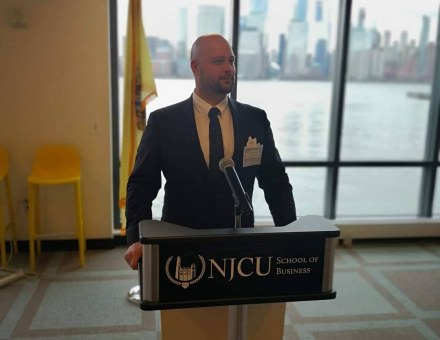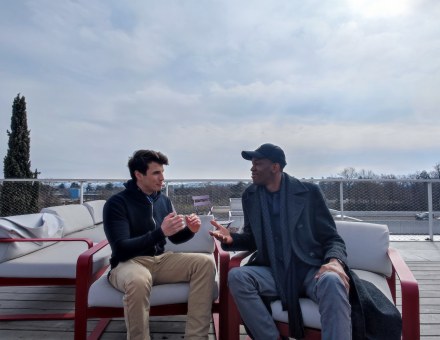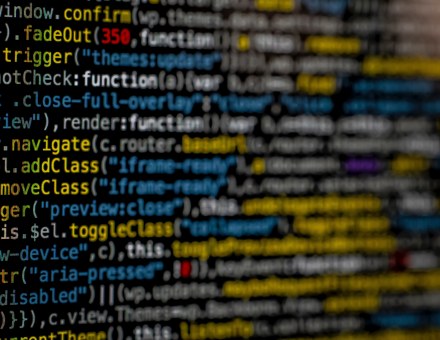Online privacy has never been as hot a topic as it is today. In light of the need to make platforms handling personal data as safe as possible and reassure users, four emlyon students have embarked on a wide-ranging consulting project examining the security of instant messaging applications, guided by adjunct professor and Hungarian attorney Dr. Greg Dzsinich.
Kickstarted in January and running until April, this independent project has teamed together students Rawan Alanazi, Nanguin Coulibaly, Anas Laabab, and Florian Muntner to explore an area of immediate public interest that has arguably not received due attention. As Florian observes, “we all use instant messenger apps, but we often know little about what happens to our data. Digital privacy is not typically discussed in public, so it is especially rewarding to have an impact on the perception of this issue.”

For supervising professor Dr. Greg Dzsinich, the stakes are clear, as is the need to explore this fertile territory that he coins “the new oil”. For him, there is a crying need for human brains to work on what may be perceived as a purely virtual problem: “we entrust our most sensitive personal and business information to apps. In so doing, such information is shared by entities who create these toolsets under various jurisdictions. The trust element needs to be verified and confirmed by independent and various means, since transparency of security does not equal the transparency of the secured content. We all know how a lock works; we can saw a lock into pieces, we can carry out physical and chemical tests of the material, thus reviewing its engineering.
The transparency of a lock gives the necessary level of trust to people. This trust verification does not mean that we may see through all the homes and offices which are protected by such locks. It is of paramount importance that apps be secure not only from a technological point of view, but also from the perspective of compliance. Both perspectives must receive verification and result in an easy-to-understand decision making point for users. This is where independent academic research plays a key role and where emlyon can be a global initiator. This early maker attitude is what makes us a global top 40 institution”.
Managing, benchmarking, analyzing, and designing

The team got to work on structuring their project and deciding upon methodology, before performing market studies to ascertain the right target audience and presenting their findings. For Anas, operations have gone smoothly, with each team member playing a fluid role: *“in the team there are no strict job descriptions, allowing each of us to work as an analyst, designer, and project manager at different times. This flexibility provides us with the opportunity to demonstrate our diverse skills and capabilities, making our team unique and creative”. An important stage involved a comparative market study before delving into the crux of the matter - security.
For Nanguin, these first steps in the process were crucial: “I explored the different websites with similar content to ours to better understand the market and know how to position ourselves. Collectively, we explored the security approaches of different applications and tried to understand them”.
Great minds thinking alike
Despite the virtual nature of the subject, the project serves to underline a very real, professional demand and one for which the human brain can do a lot of the work. For Dr. Dzsinich, this is directly in line with the learning objectives of the school’s MSc in Cybersecurity & Defense Management program: “among the aims of the MSc are the honing of skills and the developing of knowledge that meet specific industry needs. There is no faster working computer than human perception so, rather than relying upon SEO every time for such investigations, getting four great student minds thinking alike has proven a great learning experience.”

Team member Rawan echoes the professor’s emphasis on human perspective. For as long as apps are presented as secure, the choices made by users hinge upon perception and understanding. The students’ goal is to inform such choices by improving understanding: “by collaborating in sharing perspectives on a subject that is really important in the technology market, we have gained valuable insight into one of the most potentially dangerous impacts that a lack of cybersecurity could have on our daily life. Helped by Dr. Dzsinich, our key motivation is to find a simple way to spread awareness among people”.
Keeping information in the right hands
The dilemma faced by all app users, data protection, is the objective for this team of international students. To quote Rawan, “Cybersecurity is about maintaining and protecting confidential sensitive information from falling into the wrong hands to be used for malicious purposes such as identity theft, fraud, and phishing scams.” Similarly, team member Florian fears that some users will adopt a “I have nothing to hide” mindset, which he states should not detract from the importance of platforms being secure and users correctly informed on privacy matters. Providing even more context, Nanguin places emphasis on the “philosophy of different chat applications” and the various security parameters in operation, underlining how rich but also complex an area the students are exploring.
For teammate Anas, this endeavor, “absolutely fits the MSc in Cybersecurity & Defense Management program program as it focuses on studying the cyber implications and impacts of technology usage in businesses and in personal life, as well as the exploration of effective techniques and approaches to manage them.” The “new oil” of which Dr. Dzsinich refers to is plentiful but, via such an academic initiative, the hope is that this oil will be responsibly and independently mined and secured for subsequent users.


